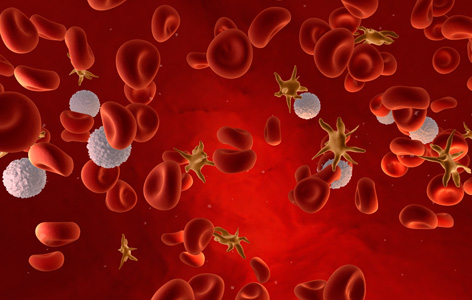Home page Description:
PM researcher discovers new drug target, which could lead to improved treatments for leukemia.
Posted On: July 15, 2015

Image Caption:
Healthy myeloid cells develop into red blood cells, white blood cells and platelets, all of which circulate in the blood.
Acute myeloid leukemia (AML) is a cancer of the blood and bone marrow. It is caused by immature blood cells, known as myeloid cells, which multiply in a rapid and uncontrolled manner, interfering with the production of mature, healthy blood cells.
Over the past 20 years, treatments for AML have remained mostly the same, and cure rates have remained low: conventional treatments can cure up to 40% AML cases. To improve AML survival rates and health outcomes, researchers are searching for new therapeutic strategies to eliminate the cancer.
PM Senior Scientist Dr. Aaron Schimmer and colleagues discovered that the protein ClpP may be a promising new target for treating AML. ClpP is a component of mitochondria, which generate the energy a cell needs to grow and multiply.
Researchers found that 45% of patients with AML had cancerous cells containing high levels of ClpP. They showed that interfering with ClpP activity is toxic to these cells, presumably because it impairs their ability to produce energy. In contrast, interfering with ClpP activity had little effect on healthy blood cells.
These findings suggest that the ClpP protein represents a new therapeutic target that could be used to develop more effective treatments for AML patients with high levels ClpP. As a next step, Dr. Schimmer’s team will collaborate with medicinal chemists to develop a drug that specifically targets ClpP in mitochondria.
This work was supported by the Canadian Stem Cell Network, the Leukemia and Lymphoma Society, the National Institutes of Health, the Canadian Institutes of Health Research, the Terry Fox Research Foundation, MaRS Innovation, the Ontario Institute for Cancer Research, The Princess Margaret Cancer Foundation and the Ontario Ministry of Health and Long-Term Care. J Dick holds a Tier 1 Canada Research Chair in Stem Cell Biology. B Raught holds a Tier 2 Canada Research Chair in Proteomics and Molecular Medicine. J Moffat holds a Tier 2 Canada Research Chair in Functional Genomics of Cancer.
Inhibition of the mitochondrial protease ClpP as a therapeutic strategy for human acute myeloid leukemia. Cole A, Wang Z, Coyaud E, Voisin V, Gronda M, Jitkova Y, Mattson R, Hurren R, Babovic S, Maclean N, Restall I, Wang X, Jeyaraju DV, Sukhai MA, Prabha S, Bashir S, Ramakrishnan A, Leung E, Qia YH, Zhang N, Combes KR, Ketela T, Lin F, Houry WA, Aman A, Al-Awar R, Zheng W, Wienholds E, Xu CJ, Dick J, Wang JC, Moffat J, Minden MD, Eaves CJ, Bader GD, Hao Z, Kornblau SM, Raught B, Schimmer AD. Cancer Cell. 2015 June 8 [Pubmed abstract].
Over the past 20 years, treatments for AML have remained mostly the same, and cure rates have remained low: conventional treatments can cure up to 40% AML cases. To improve AML survival rates and health outcomes, researchers are searching for new therapeutic strategies to eliminate the cancer.
PM Senior Scientist Dr. Aaron Schimmer and colleagues discovered that the protein ClpP may be a promising new target for treating AML. ClpP is a component of mitochondria, which generate the energy a cell needs to grow and multiply.
Researchers found that 45% of patients with AML had cancerous cells containing high levels of ClpP. They showed that interfering with ClpP activity is toxic to these cells, presumably because it impairs their ability to produce energy. In contrast, interfering with ClpP activity had little effect on healthy blood cells.
These findings suggest that the ClpP protein represents a new therapeutic target that could be used to develop more effective treatments for AML patients with high levels ClpP. As a next step, Dr. Schimmer’s team will collaborate with medicinal chemists to develop a drug that specifically targets ClpP in mitochondria.
This work was supported by the Canadian Stem Cell Network, the Leukemia and Lymphoma Society, the National Institutes of Health, the Canadian Institutes of Health Research, the Terry Fox Research Foundation, MaRS Innovation, the Ontario Institute for Cancer Research, The Princess Margaret Cancer Foundation and the Ontario Ministry of Health and Long-Term Care. J Dick holds a Tier 1 Canada Research Chair in Stem Cell Biology. B Raught holds a Tier 2 Canada Research Chair in Proteomics and Molecular Medicine. J Moffat holds a Tier 2 Canada Research Chair in Functional Genomics of Cancer.
Inhibition of the mitochondrial protease ClpP as a therapeutic strategy for human acute myeloid leukemia. Cole A, Wang Z, Coyaud E, Voisin V, Gronda M, Jitkova Y, Mattson R, Hurren R, Babovic S, Maclean N, Restall I, Wang X, Jeyaraju DV, Sukhai MA, Prabha S, Bashir S, Ramakrishnan A, Leung E, Qia YH, Zhang N, Combes KR, Ketela T, Lin F, Houry WA, Aman A, Al-Awar R, Zheng W, Wienholds E, Xu CJ, Dick J, Wang JC, Moffat J, Minden MD, Eaves CJ, Bader GD, Hao Z, Kornblau SM, Raught B, Schimmer AD. Cancer Cell. 2015 June 8 [Pubmed abstract].




